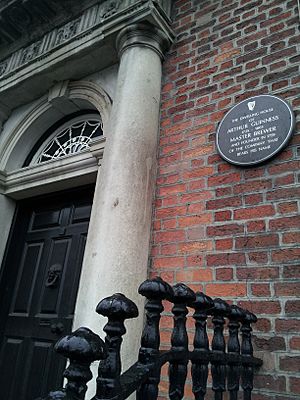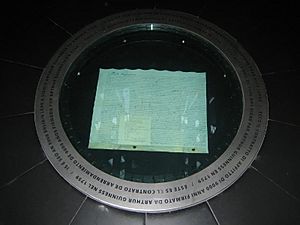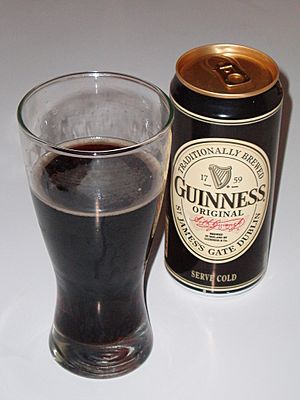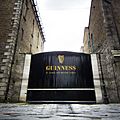Arthur Guinness facts for kids
Quick facts for kids
Arthur Guinness
|
|
|---|---|
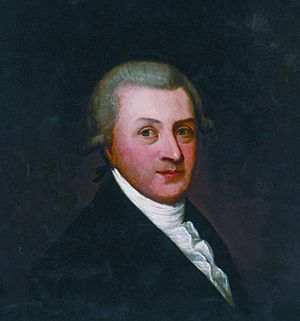 |
|
| Born | 24 September 1725 |
| Died | 23 January 1803 (aged 77) Mountjoy Square, Dublin, Ireland
|
| Resting place | Oughter Ard, Kildare, Ireland |
| Nationality | Irish |
| Occupation | Brewer and businessman |
| Known for | Founder of Guinness |
| Spouse(s) | Olivia Whitmore |
| Children | 21 |
Arthur Guinness (born September 24, 1725 – died January 23, 1803) was a famous Irish brewer. He started the well-known Guinness brewery business. Arthur Guinness was also a smart businessman and a kind person who helped others.
When he was 27, in 1752, Arthur Guinness received £100 from his godfather, Arthur Price. Price was an important church leader. Guinness used this money wisely. In 1755, he opened his first brewery in Leixlip, which is near Dublin.
In 1759, Guinness moved his business to Dublin. He rented a large brewery at St. James's Gate. He signed a very long lease for 9,000 years. The rent was £45 each year.
Contents
About Arthur Guinness
Arthur Guinness's parents, Richard and Elizabeth, were both children of farmers. His father's family came from the McCartans, a powerful family in County Down. Recent DNA tests suggest this link.
There is some debate about when and where Arthur Guinness was born. His gravestone says he died at 78 years old in 1803. This means he was born in late 1724 or early 1725. The Guinness company chose September 28, 1725, in 1991.
He might have been born in Ardclough, County Kildare, at his mother's home. Another idea is that he was born in Celbridge. His parents lived there in 1725. His father worked for Dr. Arthur Price there.
In 1752, Dr. Price left £100 to Arthur and his father in his will. Arthur started his first brewery in Leixlip in 1755. He later bought more land nearby in 1756. He developed this land for investments.
Arthur Guinness was a Protestant Christian. In 1761, he married Olivia Whitmore in Dublin. They had 21 children together, but only 10 lived to be adults. Olivia's father was a grocer in Dublin. Her mother was from County Kildare. Olivia also brought £1,000 as a dowry when they married.
From 1764, they lived in Beaumont House. Arthur built this house on a large farm. This area is now part of Beaumont Hospital in north County Dublin. Arthur renamed the area "Beaumont," which means "beautiful hill." Later, the local church parish also used this name. From 1798, he lived in Mountjoy Square in Dublin. This area had elegant Georgian architecture. Three of his sons also became brewers. His other family members became missionaries, politicians, and writers.
Arthur Guinness died in Dublin in January 1803. He was buried in his mother's family plot in Oughterard, County Kildare.
His Role in Politics
Arthur Guinness supported Henry Grattan in the late 1700s. Grattan wanted to lower taxes on beer, which was good for Guinness's business. Guinness was one of four brewers who represented their guild. He served on the Dublin Corporation from the 1760s until he died.
Like Grattan, Guinness supported Catholic Emancipation from 1793. This meant giving more rights to Catholics. However, he did not support the United Irishmen during the Irish rebellion of 1798. Some people even accused him of spying for the British.
Generally, the Guinness family later supported Ireland remaining part of Britain. Arthur himself wanted "Ireland to remain under British control." However, many historians point out his friendships with Irish Patriot Party members. He even gave a gold box to Henry Grattan in 1790. The Patriot Party wanted more power for Ireland within the British system.
Becoming a Brewer of Porter
Guinness first leased a brewery in Leixlip in 1755. He brewed a type of beer called ale. Five years later, he left his younger brother Richard in charge there. Arthur then moved to St. James' Gate in Dublin in late 1759. The 9,000-year lease he signed for this brewery is still on display today.
By 1767, he was chosen as the Master of the Dublin Corporation of Brewers. He started selling porter beer in 1778. Other Dublin brewers had already started making porter in the 1760s. From the 1780s, his second son, Arthur (born 1768–died 1855), worked with him. This son later took over the brewery in 1803. Arthur Guinness wrote about this in a letter in 1790:
"..one of my sons is grown up to be able to assist me in this Business, or I wd not have attempted it, tho' prompted by a demand of providing for Ten Children now living out of one & twenty born to us, & more likely yet to come..."
A big step for him was expanding his brewery between 1797 and 1799. After that, he only brewed porter. He hired members of the Purser family, who were skilled brewers from London. The Pursers became partners in the brewery for much of the 1800s. By the time Arthur Guinness died in 1803, his brewery made over 20,000 barrels of beer each year. People in Dublin later nicknamed him "Uncle Arthur."
Arthur's Family
Arthur and Olivia Guinness had 21 children. These 10 children lived to be adults:
- Elizabeth (1763–1847) married Frederick Darley, who became the Lord Mayor of Dublin.
- Revd. Dr. Hosea (1765–1841), a church leader.
- Arthur (1768–1855), who became a brewer and banker.
- Edward (1772–1833), a solicitor (a type of lawyer) in Dublin.
- Olivia (1775–1809)
- Benjamin (1777–1826), a brewer.
- Louisa (1781–1809)
- Mary (1787–1809)
- William (1779–1842), a brewer.
- John (1783–1850), a Captain in the Madras Army.
Arthur Guinness Fund
To honor Arthur Guinness, the Guinness company started the Arthur Guinness Fund (AGF) in 2009. This fund helps people develop skills and find opportunities. The goal is to help them improve their communities. Guinness has given more than €7 million to this fund.
Arthur Guinness is one of the few Irish people honored twice on postage stamps. This happened in 1959 and 2009. In October 2013, a statue of him was put up in Celbridge, his possible birthplace. In 2014, pathways were created near places from his early life. These are called "Arthur's Way."
Images for kids
-
After his father's death, Arthur Guinness II took over the brewery.
See also
 In Spanish: Arthur Guinness para niños
In Spanish: Arthur Guinness para niños
 | William M. Jackson |
 | Juan E. Gilbert |
 | Neil deGrasse Tyson |


